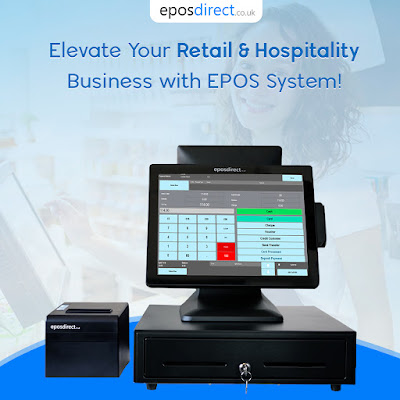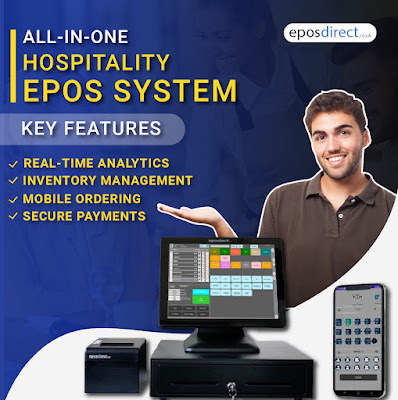The
hospitality industry has always been known for its dynamic and fast-paced
nature, with businesses constantly seeking ways to enhance customer experiences
and streamline operations. In recent years, one technological innovation that
has significantly transformed the landscape of the hospitality sector is
the Electronic Point of Sale (EPOS) system. EPOS
systems have become integral to the success of restaurants, hotels, bars, and
other hospitality establishments, revolutionizing the way they operate and
serve their customers. In this article, we will delve into how EPOS systems are
changing the game in the hospitality industry.
Streamlined Operations
Traditionally,
managing a hospitality establishment's operations involved numerous manual
processes, including taking orders, processing payments, and tracking
inventory. These tasks were not only time-consuming but also prone to errors,
leading to inefficiencies and customer dissatisfaction. EPOS systems have
emerged as a game-changer by automating and centralizing these operations.
With an
EPOS system in place, orders can be taken electronically and sent directly to
the kitchen or bar, reducing the chances of miscommunication between the
front-of-house and back-of-house staff. This leads to faster order processing,
shorter wait times, and improved customer satisfaction. Additionally, EPOS
systems facilitate accurate billing and payment processing, reducing the
likelihood of errors in bill calculations and ensuring a smoother checkout
process.
Enhanced Customer Experience
In the
hospitality industry, providing an exceptional customer experience is
paramount. EPOS system for Hospitality contributes
significantly to this by allowing establishments to personalize their services
and cater to individual customer preferences. These systems can store customer
data, such as order history and dietary restrictions, enabling staff to provide
tailored recommendations and offer a more personalized service.
Moreover,
EPOS systems often integrate with customer loyalty programs, enabling
businesses to reward repeat customers and incentivize them to return. This
enhances customer retention and fosters a sense of loyalty towards the
establishment.
Real-Time Insights
Data-driven
decision-making has become a cornerstone of success in various industries,
including hospitality. EPOS software provides
real-time insights into key metrics such as sales trends, peak hours, and
popular menu items. This information empowers businesses to make informed
decisions about pricing, inventory management, and marketing strategies.
For
instance, if an EPOS system reveals that a particular dish is consistently
popular during certain times of the day, the establishment can adjust its
staffing and ingredient orders accordingly. Similarly, if sales of a specific
item are declining, the business can strategize ways to reinvigorate interest
in that item, such as offering promotions or making recipe modifications.
Inventory Management
Effective
inventory management is crucial in the hospitality industry to prevent
overstocking, reduce wastage, and ensure that popular items are always
available. EPOS systems play a pivotal role in optimizing inventory management
processes.
By
tracking sales in real time, EPOS systems provide accurate data on which items
are selling quickly and which ones are moving slowly. This information aids in
making informed decisions about restocking and helps in preventing shortages
during peak hours. Additionally, EPOS systems can generate automatic alerts
when the stock of a particular item falls below a certain threshold,
streamlining the restocking process.
Efficient Reporting and Compliance
The
hospitality industry is subject to various regulations and compliance
requirements, ranging from food safety standards to tax regulations. Electronic
till systems simplify the reporting and compliance
process by generating detailed and accurate reports that can be easily shared
with relevant authorities.
For
instance, these systems can automatically calculate and record taxes, reducing
the chances of errors in tax reporting. Similarly, they can track allergen
information and provide accurate details to customers, ensuring compliance with
food safety regulations.
Integration and Scalability
Many
modern EPOS systems are designed to integrate with other software and services,
offering a holistic solution for hospitality businesses. They can seamlessly
connect with accounting software, online ordering platforms, reservation
systems, and more. This integration streamlines operations and reduces the need
for manual data entry across different platforms.
Furthermore,
EPOS systems are scalable, meaning they can adapt to the changing needs of a
business as it grows. Whether it's a single-location restaurant or a hotel
chain with multiple properties, EPOS systems can be tailored to accommodate
varying levels of complexity.
Contactless and Mobile Solutions
The global
pandemic accelerated the adoption of contactless technologies across
industries, and hospitality was no exception. EPOS systems have played a
crucial role in enabling contactless ordering, payment, and delivery options.
Customers can now place orders and make payments using their smartphones,
reducing physical contact and enhancing safety.
Mobile
EPOS solutions also allow staff to take orders and process payments directly at
the table, improving efficiency and minimizing wait times. This trend towards
contactless and mobile solutions is likely to persist even after the pandemic
subsides, as customers have grown accustomed to the convenience and safety
these options offer.
Conclusion
EPOS
systems for restaurants have emerged as a transformative force in the hospitality
industry, revolutionizing operations, enhancing customer experiences, and
driving data-driven decision-making. It can be integrated with Kitchen Display System UK for
online ordering, streamlining operations, providing real-time insights,
improving inventory management, and ensuring compliance with regulations. The
integration of contactless and mobile solutions further highlights the
adaptability and innovation that EPOS systems bring to the sector. As the
hospitality industry continues to evolve, EPOS systems will remain a
cornerstone of success, shaping the way establishments serve their customers
and manage their operations.


